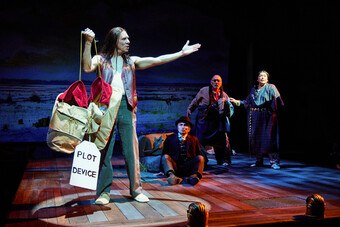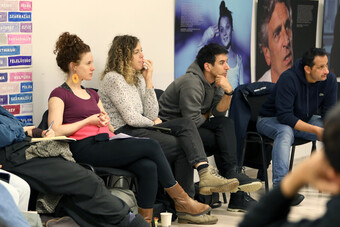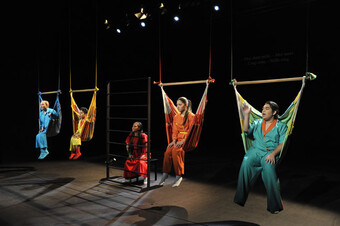But I Really Don’t Want To Direct
Once, outside a performance, an actor/director/playwright (I’ll never tell who) approached me in a kind of passive-aggressive fervor. S/he began asking how I became a critic, what were my qualifications, and finally, what did I really want to do? The first two questions were easy, but the last? Well, that left me stammering.
I really wanted to be a critic. Like, always wanted it. S/he pressed on. “Yeah, but really. What do you really want to do?”
I said I wrote some fiction, some essays on the side, but really, truly, I had my dream job. I saw all the performance I wanted, whenever I wanted, with whomever I wanted, researched every show, examined each, in print, for pay (less pay these days, but still), all the time. S/he still wasn’t satisfied, and we both left the conversation slightly annoyed and puzzled.
I’m guessing, but I think my inquisitor’s subtext was a familiar one: that every critic is a frustrated something else. But isn’t theater criticism enough of its own thing? And if not, why not?
The premise of this week of essays on criticism is the “Critic as Artist,” but I think that’s the wrong approach. Despite Oscar Wilde’s admirably strenuous contortions in “The Critic as Artist” on the profession’s behalf, I don’t believe arts criticism is itself art. But that doesn’t mean it is without its own merits. I believe the artist/critic relationship is less symbiotic and closer to that of a host and parasite, but just look what we’ve done with leeches. And there’s some anecdotal evidence hookworm, though irritating, cures asthma.
A critic’s pen (or, more likely, cursor), recklessly wielded, has very real potential to damage progress within the form.
I’m not being entirely glib here. A critic’s pen (or, more likely, cursor), recklessly wielded, has very real potential to damage progress within the form. It’s some small miracle that the psychologically fragile Sarah Kane, after her initial eviscerating critical reception, continued writing as long as she did. But reading the evolving critical response to her work—watching the recoil become an embrace—offers an overview of the culture’s readiness for her particular message, opens the door for us to examine what may have changed in her, in us, and in the world between the writing of her first play and her last.
Without that critical assessment, without critics going on record to champion a playwright, performer, or movement—or conversely, without critics opening up a can of whoop-ass on a show they despise and occasionally receiving a bigger one in return—would theater retain even its peripheral position in our culture? No way. Not even if it’s a review of your city’s 10,000th touring performance of Nunsense. It’s a critic’s job to compare and contrast, to examine the spaces in between those performances, to see where they intersect with our lives and where they diverge, and to keep this ephemeral living art form among us a little longer by recording what happened onstage, while challenging audience passivity in the bargain.
And yet criticism, which by now should have evolved from a one-sided conversation (and we critics all know colleagues who are so accustomed to spouting opinions unchallenged that every “conversation” becomes a monologue) to a full-fledged back-and-forth between audience and critic, still drags its knuckles. Over in the online sports section of my particular newspaper, the threads are lively, angry, and impassioned. In the political and local sections, they’re horrific cesspools of blatant racism and sexism that continue for pages. But here on the performing arts page, save for the occasional response from someone associated with a production that received a negative review, they’re empty.
I recently reviewed a production of Endgame I didn’t like, and I didn’t like it for fairly subjective reasons: Beckett didn’t want any “improvements” on his work, and considering what Beckett has given me, I feel a responsibility to act as his sentry. Obviously, there are arguments to be made for going against Beckett’s wishes. Certainly this director, a respected professional at a respected professional house believed so. I gritted my teeth, girded myself for the backlash and waited.
I’m still waiting. Why didn’t anyone call me a regressive parrot, or agree with me, or say anything at all?
Maybe there’s silence because theaters have internalized the idea that they shouldn’t engage a critic, lest they earn their wrath. Maybe it’s because critics have spent decades being complacent and often don’t feel obligated to engage with any of what they dish out. Maybe it’s because reviews don’t make money for a news outlet, and as a result, don’t get promoted the way crime and sports get promoted. Whatever the case, a critic shouldn’t be the last public word on a production, they should be the first, and 21st century criticism—should anyone care to pay for it—is in a position to reimagine itself as a gathering place for those who care about the arts in general, and a region’s arts scene in particular.
John Guare recently said that contemporary playwriting offers a record of “how it felt to be alive in the 21st century.” In turn, criticism (and even reviews, if you choose to make that distinction) offers a record of how our civilization responded to the arts. Theater critics are not theater artists, but we are recorded proof that theater mattered, and for me, that’s more than enough.












Comments
The article is just the start of the conversation—we want to know what you think about this subject, too! HowlRound is a space for knowledge-sharing, and we welcome spirited, thoughtful, and on-topic dialogue. Find our full comments policy here
You make valid points in your commentary piece, although I do wonder if we critics aren't destined to follow the dinosaur. In my region I don't think many people who attend theatre feel drawn to voice opinions in a public manner, via comments sections at the end of reviews. What comments appear seem to fall into two categories: 1) thanking the critic for agreeing with their opinion, or 2) berating the critic for disagreeing with their opinion. It's not in depth engagement. Any in depth response I receive (infrequently) arrives via private message or email. I'm not sure if people are afraid they will be 'graded' on their comments or don't want to 'look foolish' in public. I'd guess that a large number don't care about or respect critics' opinions; critical analysis ranks very low in educational programs, so few acquire the habit.
I would welcome the opportunity to participate in an audience engagement forum or discussion. The silence can be deafening and fails to serve the art.
Alexandra Bonifield Dallas TX criticalrant.com
Thanks for this, Wendy. I appreciate any desire and effort to stir dialogue. I co-founded a theatre (Epic Theatre Ensemble), after all, whose root cause is to place theatrical events at the center of civic discourse, be it Off-Broadway, at a public high school, or in a community center. Mind you, that dialogue was to happen in person and surrounding the play. I know the Inquirer and other papers track on-line engagement spurred by Arts section reviews and features and use the seeming absence of interaction as an indication of apathy -- resulting in painful budget cuts and beyond that affect your profession, my profession, and our entire ecosystem. So I'm all for questioning why there is not greater back and forth between audiences and critics, between artists and critics, critics and critics, artists and artists.....
But here's the thing: although experiencing a play is a shared and public act, the nature of effective theatre is to inspire emotion and transformation that often is deeply personal. I know there are people who can be vulnerable and expressive on line, but many cannot. So to measure impact through website posts once again misunderstands the value of the art form (not saying you're doing this, Wendy, but rather the owners of newspapers). Sports may generate passion, but to debate the health of Chase Utley's knees or David Ortiz's achilles doesn't require the same amount of self-revelation. Talk-radio has created a culture where sports and political journalists expect and ask for reactive responses as well as thoughtful ones. Theatre neither has that history or apparatus to compare. A potential comparison between talking about theatre and talking about religion might reveal the reasons for the silence.
Oh, I disagree. I know some fierce theater queens who will happily, smartly, off-the-cuff and/or with deep reflection argue the merits and demerits of various Sondheim productions until your ears bleed. I think it's primarily a problem of engagement--that is, paying outlets don't think it's worth their time to developa strategy for wooing eyes and clicks. HowlRound's weekly #newplay discussions on Twitter are such a simple, sustained method for cultivating an audience, but there are so few theater staffers left to advocate for such ideas. Perhaps niche sites really are the future of arts journalism. A shame, and still a bit of a wait until they hit their real professional (and by that, I mean "paying") stride.
Hmmm. Yes, true, I agree there are definitely individuals and constituents eager to banter as well as go in depth about their responses to productions (especially musicals) and issues in the field -- as Howlround proves as well as ArtsJournal and various other on-line outlets with off-line meaning. In terms of newspapers soliciting public reaction to their reviews and features -- for something like ENDGAME, especially, where fears of lack of expertise may mix with conflicts of emotion and opinion -- I still think the absence of such a public response is not due necessarily to lack of invitation or lack of interest. For example, for People's Light's production of THE TRIP TO BOUNTIFUL we have received more heartfelt, long emails from both subscribers and single ticket buyers than any production in my (admittedly brief) tenure here. It's been a remarkable waterfall of emotions, daily stories, yearnings for connection. At the same time we have seen far fewer responses on Twitter or Facebook. We have made the same effort to attract on-line interaction and dialogue as with other productions, but this play produces such deeply vulnerable emotions our audiences clearly prefer to contact us in a way that sparks a private conversation. So while there are many examples that might offer the opposite, I do think there can be this distinctive dynamic that that may be at odds with audiences mixing it up with artists and critics in a public brew.
a critic shouldn’t be the last public word on a
production, they should be the first, and 21st century criticism—should
anyone care to pay for it—is in a position to reimagine itself as a
gathering place for those who care about the arts
Yes, Wendy, this has always been my frustration as a playwright, that the critics opinion is usually the only public discussion of a play's worth. I'm wondering if there are other ways for artists and critics to engage in some kind of public forum, besides letters to the editor, or comments at the bottom of an article.
Ideas anyone?
At the Pen & Pencil theater critics forum months ago (attended by Wendy, Phila. Weekly's J. Cooper Robb, and me), we urged our audience to use the online comment sections to respond to our reviews -- in part to show our papers that people really read the reviews, in part to provide some response and discussion. Total comments on my reviews at City Paper since then? Zero.
"A critic shouldn't be the last public word on a production, they should be the first" -- well said!
I imagine an intelligent ongoing online theater discussion with none of the vitriol and ignorance too often expressed in political and sports comment threads. Anyone want to join us?
Thanks for the vote of confidence, Mark! I so wish we had a regional critics' circle so we could brainstorm ideas for coverage and engagement. We should make that happen.
Wendy, great piece. And hoping you never doubt your vital voice as a theater writer. And yes, reporting what you see at the theater and assessing its merits is a vital part of theater culture and history. Some reader will always want informed criticism, reviewing and reporting of live performance. It matters even when it seems to be a vain exercise.
Course, the craft has been completely poisoned by thumbs up/thumbs down movie reviewing, which editors and readers mostly want now. And the underpaying is an insult to the profession. Unfortunately, at any given time, we are, like the oldest profession, as good as the day we can work. Meanwhile, we have to do what we do and hopefully not get bitter, vain, jealous, petty, pedantic, vindictive, obsessive, callous, cheap, backstabbing, personal or worse of all, hacky. Course, these are hazards of the trade you never need worry about.
See you at the theater and in the papers. Love Lew
Thanks, Lew! You've been fighting the good fight for a long time. And yes, thumbs down on the thumbs, stars, whatever. And to Twitter reviews, too.